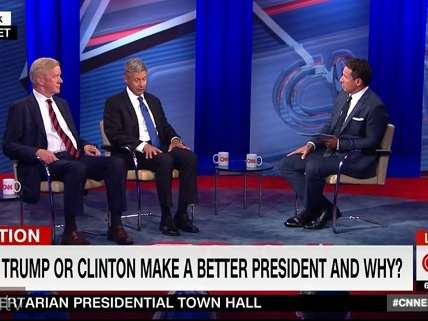Can Gary Johnson Be the New Ross Perot? The New Yorker Thinks So
For better or worse a thought leader of sorts for middle and even some highbrow American smartypants, the New Yorker (more or less the ur-source of why everyone you know hates the Koch Brothers) tells their readers this week that they should have some serious respect and regard for Libertarian Party candidate Gary Johnson this year.

Some highlights and summations from a piece by political journalist Ryan Lizza. He starts by laying out a best-case reason for hope for a strong showing with the same sort of linking Libertarian partisans have been doing this year:
the unpopularity of Clinton and Trump has created an opportunity for Johnson to at least match Perot's impressive showing… For anti-Trump conservatives still searching for an alternative, Johnson may be the only option. On the left, anti-Clinton Democrats, including some determined supporters of Bernie Sanders, would prefer a candidate who is more socially liberal and noninterventionist than Clinton.
Johnson's own explanation as to what's so bad about Clinton and Trump:
"Hillary has to go out and she has to appeal to this 'everything's free, government can accomplish anything, what can you give us' constituency. She's doling it out as fast as she can. Trump is appealing to this anti-abortion, anti-immigration, 'bomb the hell out of them, lock them up, throw away the key' constituency."
Reporter Lizza finds Johnson "charming and more transparent than most politicians—sometimes to a fault" with "a knack for putting a happy face on the rougher edges of libertarianism." He quotes Johnson crediting a lifelong vision of himself as a libertarian to a book (whose name he can't recall) he read when he was 18 "about what it means to be a libertarian." (The book specifically called What it Means to be a Libertarian, by Charles Murray, didn't come out until Johnson was already governor of New Mexico in 1996, so it can't be that.) He gets Johnson (part of the charming transparency Lizza eludes to) to say (perhaps jokingly) that he could illegally hook up Lizza with a marijuana product the company Johnson was CEO of between his Libertarian presidential runs, Cannabis Sativa, wants to sell.
Lizza shows a Libertarian ticket happy to hype each other, with vice presidential candidate William Weld, former governor of Massachusetts through much of the 1990s, saying of Johnson that:
"I thought he was just so cool that he would do these giant slaloms after doing an Iron Man triathlon and ski five hundred feet in the air and then land in a pail of water," Weld told me. "I mean, he is a serious daredevil."
Lizza follows with a decent discussion of how and why third parties have been significant in the past, including Teddy Roosevelt in 1912, Strom Thurmond in 1948, and Ross Perot in 1992, a discussion that alas casts doubts on the idea that the L.P. will shake the world too much this year: what is the distinct issue that the Libertarians can expect to bring out giant percentages of the vote in 2016, analogous to Perot and the deficit, Thurmond and segregation, and Roosevelt and the progressive reform agenda?
As Lizza sums up Johnson's agenda:
Johnson wants to raise the retirement age for Social Security and to limit Social Security benefits for the wealthy. He wants to get rid of the I.R.S. and replace most of the tax code with a single consumption tax. He wants to abolish the death penalty, expand vouchers for private school, and drastically pull back the American military from its commitments around the world. "The unintended consequence of when you put boots on the ground, when you drop bombs, when you fly drones and kill thousands of innocent people—this is resulting in a world less safe, not more safe," he told the crowd.
Sensible, and one could find issue polls that show support for those elements of his message, from social security to military commitments. But they don't seem to be the issues driving the American id in an election year when the major party majorities want a government that either or both want to further restrict speech and trade, continue spending out of control, and consider either giving away more government money or fears of foreigners the most driving issues facing the Republic.
But Johnson/Weld being the only team out there speaking up for a sane and constitutionally limited government should, one hopes, help destroy the hoary prejudice that the Third Party candidates are the unrealistic freaks, as it seems to have done for the New Yorker.


Show Comments (42)